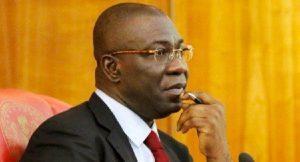
• Only 46.4 million Nigerians with jobs
• OPS seek definitive action as inflation compounds household woes
It’s double trouble for most Nigerian families, having to cope with the increasing number of dependents amid constant struggles with stagnant earnings and dwindling fortunes now punctured by rising inflation.
Findings have shown that the number of dependents in the country is on a steady rise on the back of high population, and more recently, unemployment rates, mounting pressure on disposable incomes and limiting the impact of government’s intervention in the economy.
Already, rising inflation, especially that of food, is putting pressure on the already stressed household incomes, leaving many homes with little savings and capacity to absorb new shocks.
Out of the 122,049,400 economically active or working age population (15 – 64 years of age) as at Q4, 2020, based on recent data from the National Bureau of Statistics (NBS), only 46,488,079 people are in employment (i.e., people with jobs).
Of this number, 30,572,440 were full-time employed (i.e., worked 40+ hours per week), while 15,915,639 were under-employed (i.e., working between 20-29 hours per week).
This means that only one in three people in the continent’s largest economy were unemployed just as food inflation has accelerated at the highest pace in 15 years, compounding the misery of many households.
Also, the Coronavirus pandemic has robbed 70% of Nigerians of some form of income, according to a COVID-19 impact survey published by the NBS last month.

Soaring food costs have been in part blamed on a worsening conflict between farmers and herders in the nation’s agriculture belt that the Federal Government is struggling to quell.
The unrest, combined with the more than decade-long Boko Haram insurgency in the northeast, banditry in the northwest, a weakening currency and higher fuel prices have also contributed to rising food prices, according to SBM Intelligence, a Nigerian research firm.
Food prices will remain elevated until the security crisis, which has prevented farmers from returning to their land, is resolved, said SBM Intelligence.
Until then Nigerians, who already spend more than half their earnings on food, will have no option than to cut down. Just over 50% of all households reported reduced consumption between July and December last year due to the twin pressures of falling wages and rising food costs, according to the NBS.
With a high number of the population without jobs, productivity reduces and pressure mounts on scarce resources to cater to the demands of the remaining citizens.
Indeed, Nigeria’s population growth rate of 3.2% dwarfs the International Monetary Fund’s GDP growth projection of 2.53% in 2021, raising concerns about unchecked fertility rate and living standards of Nigerians.
The rise in number of persons in the economically active or working age population rose 4.3% from 116,871,186 in Q2 2020, to 122,049,400. The percentage increase is higher than the population growth rate.
Despite a stimulus package of N2.3 trillion or 4% of GDP to check the impact of the pandemic on Nigerians, analysts note that rising unemployment alongside population growth, is troubling and reflects the crisis of poverty, unemployment, debt and productivity in Nigeria.
The country’s population is projected to grow by an average of 500,000 monthly and a further six million increase yearly according to the 2020 World Population Data Sheet’ by the Population Reference Bureau (PRB).
Nigeria’s index position, according to the PRB data coupled with its teeming population, portends huge socio-economic implications, as the country’s escalating population, presently estimated at 206.1 million, is targeted to reach almost 300 million in 15 years’ time.
Similarly, Nigeria is the fourth among the most fertile countries exceeding both the continent’s and global average Total Fertility Rate (TFR), which is 4.4 and 2.3 respectively.
While the Lagos Chamber of Commerce and Industry (LCCI) has raised concerns about the country’s food production methods in the light of rising inflation, Vice President Yemi Osinbajo, while addressing a recent UN Food Systems Summit, organised by the Federal Government, affirmed the concerns, noting that the country’s population is growing much faster than the economy, limiting its ability to build resilient, sustainable food systems.
According to LCCI’s Director General, Dr Muda Yusuf, the rising dependency ratio is a manifestation of the weaknesses in economic performance, fragile output recovery, worsening macroeconomic conditions, spiking inflation, erosion of real incomes and weakening purchasing power.
He noted that the high dependency ratio also reflects the country’s cultural disposition of being one’s brothers’ keeper, which is a good social support system peculiar to Africans. However, he stated that such disposition naturally, also adversely impacts on the capacity to save.
“The way out of this quagmire is to fix the economy and instill confidence in domestic and foreign investors. We need to address the headwinds to economic growth and positive investment trajectories. These include policy, regulatory and institutional reforms. Policy makers should focus on systemic and structural issues constraining growth. It is critical to ensure the security of life and property. Policy makers should transition from a micro management model to a systemic economic management model.
“This would create better trajectory for growth, investment, job creation inclusiveness and economic management credibility,” he added.
According to the Director-General of the Nigeria Employers’ Consultative Association (NECA), Timothy Olawale, Nigeria’s population growth has been increasing on the average, side by side with a very high unemployment rate, noting that the higher the unemployment rate in an economy, the higher the poverty level and associated welfare challenges, including heightened dependency.
He argued that the nation has not seized the opportunity of a high population growth to enhance its quest for economic development as a result of its slim ability to mobilise its voluminous resources to meet the needs of its growing population.
“Unfortunately, no adequate sustainable strategy or good policy measures have been adopted to deal appropriately with this problem to ensure that its growing population is proportional to available jobs, thereby reducing dependency ratio.
“Nigeria needs to adopt and formulate effective policies that would address the demand and supply side of labour to create adequate jobs.
“Economic growth implies an improvement in economic welfare through higher real GDP, but also through an improvement in other economic indicators, such as human capital, better infrastructure, reduced poverty and improved healthcare standards,” he added.
With inflation already on the rise, the Director-General, Manufacturers Association of Nigeria (MAN), Segun Ajayi-Kadir, warned that 18.17% inflation rate is not healthy for the wellbeing of the people and the growth aspiration of the economy. It should therefore be properly managed before it spirals out of control, he advised.
For a sector that accounts for productivity and job creation, MAN explained that there is a strong relationship between manufacturing sector growth and inflation rate, just like exchange and interest rates.
“The current inflationary condition in Nigeria adversely affects the profitability of the sector. Clearly, there is an urgent need for government to intentionally ensure price stability before the situation becomes deplorable,” he added.
In a recent conversation on “Policy steps to tackle Nigeria’s rising unemployment rate”, an economist, Dr. Biodun Adedipe, noted that the country’s misery index has risen astronomically in the last eight years, depicting the challenging economic situation of high unemployment (33.1%), high inflation and slow GDP growth.
According to him, the management of the country’s unemployment level remains critical to address issues like youth restiveness and agitations.
He noted that Nigeria has a large service sector, but lacks a strong manufacturing base to rest on like the United Kingdom and the United States.
“As a country we need policies that provide the incentives for attracting private capital into the economy, to boost industrialization and support key sectors of the economy,” he said.



















